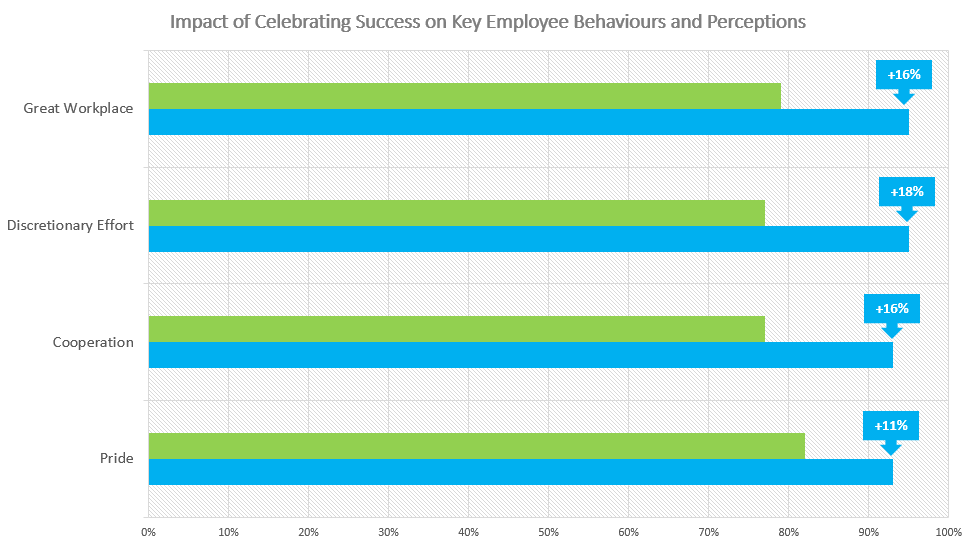It’s fair to say that most organizations have some way of recognizing their best people. In fact, the Conference Board of Canada’s 2017 report The Power of Appreciation shows that Canadian organizations spend on average $139 per FTE on recognition ($161 in the private sector and $84 in the not-for-profit sector).
Recent research from Great Place to Work® shows that organizations that celebrate success also ranked higher in key business outcomes such as discretionary effort, cooperation, pride and overall impressions of the workplace than those who did not.
Organizations with top quartile scores on such statements as “people celebrate special events”, “management shows appreciation for good work and extra effort”, and “everyone has an opportunity to get special recognition” significantly outperformed the bottom quartile cultures by +11% to +18% on key employee behaviours and workplace outcomes. In essence, the stronger the cultures for celebrating success the stronger employee discretionary effort, cooperation, pride and overall impressions of the workplace. All good news.

However, public celebrations are not necessarily what everyone prefers (for some it’s downright embarrassing!) Furthermore, the CBOC’s study shows that the number one way that organizations are recognizing their employees (and their biggest spend) is through long-service awards and celebrations. For some organizations, that’s every five years, and others it’s a “Quarter Century Club”. What if an employee does not feel valued, able to contribute meaningful work and feels she or he plays an important role in the organization’s success before that milestone? And, does this type of award have the same resonance as being acknowledged for your unique contributions by someone you would work with every day? The practice almost sounds a little “punch clock management” doesn’t it? A throwback to the days when we expected employees to stay in one organization their whole career. But we know that is rare today, both in employees’ choice and, post downsizing era, organizations’ actions too.
So, what should a company or leader that really care about their people do? How can they boost trust and retain their top talent during this current talent shortage?
Individual Recognition Matters
Three separate datasets from GPTW, CBOC and Metrics@Work (referenced in Forever Recognize Others Greatness) points to the importance of individuals being recognized by their direct supervisor and colleagues as more desired than corporate celebrations. Quite simply, 90% or more employees report most valuing a verbal thank-you, personalized specific words of acknowledgement, and a written thank-you, in that order. Simple no to low cost options that demonstrate appreciation for good work and extra effort.
But how could it be that straightforward?
Opportunities for everyone to receive special recognition is instrumental to key employee behaviours that drive business results. GPTW research shows that appreciation and recognition practices correlate .80 or higher with multiple employee behaviours and outcomes essential to success in the workplace today (i.e., discretionary effort, cooperation, pride and overall workplace impressions), whereas workplace celebration events correlate only .63. While any effort to celebrate success are statistically significant in higher trust, your ROI will be greatest when investing in practices that focus most specifically on recognizing and appreciating employee efforts and accomplishments vs. more generalized workplace celebrations.
In other words, it’s not about throwing out what works; if your employees look forward to receiving their milestone award, kicking up their heels with each other during the holidays, or have a tradition of honouring retirees, keep that as part of the mix. Just make sure you equally value the human touch element of recognition, with fiscal resources as well as time, attention and managerial resources.
A Need to Have…Not Just Nice to Have
What has your organization invested in creating simple, accessible strategies for leaders to recognize staff on the fly and incorporate it as part of their daily work? Do you and your leadership colleagues know how to recognize with ease, authenticity and effectiveness? What is it costing you if you don’t?
If you think this sounds all “touchy-feely”, consider the data. When your team knows their contributions are valued, needed and appreciated, they will work harder for you, trust the organization more, and be more likely to stay. That makes good business sense. And before you start thinking this is going to take too much time to intentionally show appreciation to individuals, consider how much time you spend recruiting, interviewing, retraining, mentoring, conflict managing, performance managing, and problem solving. Consider also what you would prefer to do with your time; what would make your quality of work life higher.
Let the Floodgates Open!
Consider for a moment a time when you have been happiest in your career. Did you know you made a difference? Who noticed? How did your extra effort, unique talent and loyalty get rewarded?
Now consider when you have been least satisfied. How were you treated differently? How did you think about your job and boss? How did you talk about your work to others?
Does your experience mirror this data? In which scenario did you stay longer, were more satisfied and contributed more?
It’s not rocket science to be the leader or colleague that people want to work with. Creating high trust, deeply collaborative and healthy workplace cultures is becoming one of the most important roles a leader has in today’s rapidly changing, fiscally restrained, high paced, and talent crunched work environment. How empowering it is to know that your actions today can help make a meaningful shift to workplace satisfaction. That you can be that manager, that organization, that people want to work for. Let the candidate floodgates open.
References
Conference Board of Canada. “The Power of Appreciation”
Photo Credit: https://edubirdie.com






